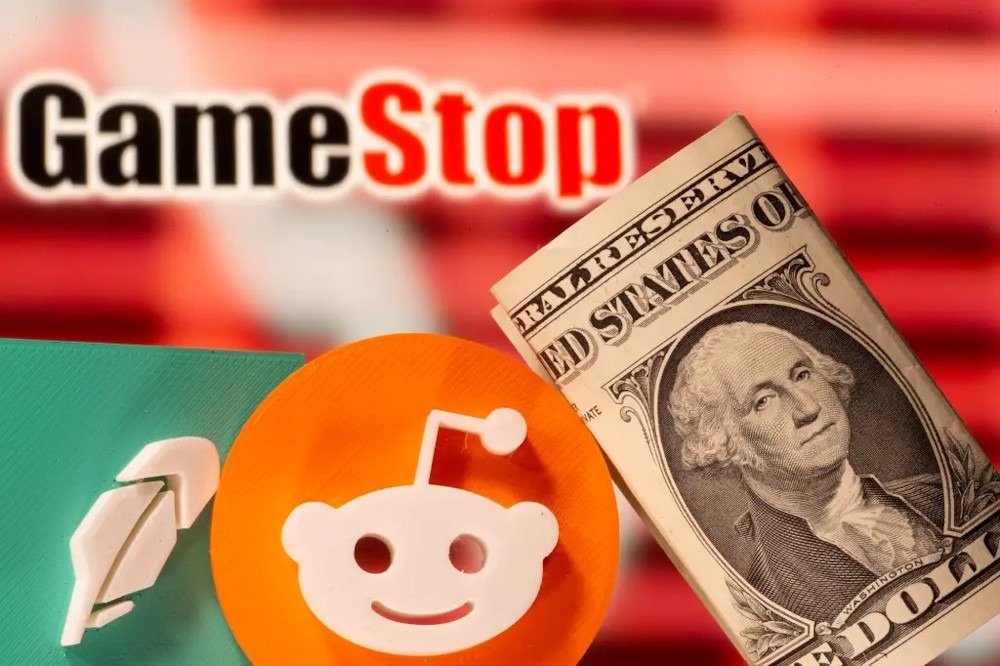The level of market froth is rising

Take a moment to consider meme stocks. There are three typical reactions to the significant increase in value of a group of meme stocks within a span of two days. One cannot help but be amazed at the current state of the stock market. The second is to have a desire to be part of the action. There is a third concern regarding the wild price gains of meme stocks, suggesting that it may be a result of the current easy money policies that are supporting the overall market.
In my opinion, the initial response was incorrect, while the second approach proved to be a guaranteed method for financial loss, as evidenced by the significant decline in meme-stock prices starting from Wednesday. The notion that loose monetary policy is propping up the market is a valid concern that deserves attention.
I don’t have any concerns about the current state of the market. I don’t believe that the shares of GameStop, AMC Entertainment, BlackBerry, and others should skyrocket just because of a meme tweeted by the long-dormant Roaring Kitty account. Instead, it is based on historical patterns: This has always been the case. If I were to tweet a meme, I’d choose a clip from “Casablanca” featuring Captain Renault, who appears utterly surprised to discover gambling taking place in the casino he frequents.
In the past, there have been various manifestations of wild speculation, with a clear distinction between traders seeking immediate gains and investors seeking a stake in the future profits of American enterprise. Speculators play a crucial role in incentivizing long-term investors to put their money at stake. Without the presence of traders who provide speculative liquidity, it would be difficult for genuine investors to sell their assets at their desired time. Consequently, this would discourage many potential buyers from entering the market.
At times, certain individuals have held a significant advantage, such as during the intense battles between Jay Gould and other influential figures of the 19th century, who vied for control over railroad company stocks. Similarly, in the 1920s, Jesse Livermore orchestrated manipulations of stock prices to deceive buyers, ultimately resulting in both immense gains and substantial losses.
In the 19th century, an individual had the power to influence markets. In the 1920s, the focus shifted to stock pools, which were groups of affluent traders that Congress accused of manipulation. This accusation ultimately led to the establishment of the Securities and Exchange Commission. Nowadays, social media plays a crucial role in facilitating purchasing coordination. Very few people show much interest in the actual business, which is one of the reasons why long-term investors often express their dissatisfaction.
Now let’s move on to the second point. If you possess the ability to anticipate when others will eagerly invest in a stock, your strategy would involve purchasing it beforehand, patiently waiting for its value to increase as demand surges, and subsequently selling it to those individuals, regardless of its profit potential. Put simply, to “outsmart the masses,” as noted by John Maynard Keynes, a renowned economist and investor in 1936.
Meme stocks represent a fascinating attempt to outsmart the masses. If you had purchased GameStop right after the Roaring Kitty account tweeted, you would have experienced significant financial gains within a brief timeframe. If you had purchased GameStop during one of the previous attempts by Reddit users to boost the stock in the past three years, you would have experienced significant losses. The same would have happened if you had bought the stock on Tuesday morning at $60 and sold it on Thursday for less than half that amount.
Many individuals believe they possess superior intelligence compared to others, yet engaging in trading proves to be a challenging endeavor. Timing is crucial, as being ahead of the curve can often lead to incorrect assumptions. If you’re not ahead of the curve, you’re just part of the crowd. Simply because certain individuals have accumulated significant wealth does not imply that it is a straightforward endeavor.
In early 2021, the surge of meme stocks occurred during a period of stock-market speculation, characterized by inflated valuations in SPACs, cannabis stocks, unprofitable tech companies, and renewable energy firms. They had a common driver: Excess funds in the economy needed a destination, and they found their way into the stock market. Historically, the stock market has been influenced by the presence of easy money, which has played a role in fueling past bubbles. It is possible that this factor is currently supporting the stock market as well.
Indeed, interest rates have experienced a significant increase, going from zero to over 5% within a span of two years. However, the state of the economy remains strong, with unemployment at historically low levels. In fact, the overall financial conditions, which consider various factors such as savings, lending, and asset values, including the actions of the Federal Reserve, are even more accommodating than they were prior to the interest rate increases, as reported by the Chicago Fed. The S&P 500 is currently at a record high, with its valuation being quite high based on price to forward earnings and other measures.
When there is a significant amount of money circulating in the economy, it becomes effortless for new ideas to capture speculative investments, even if some of those ideas lack sound judgment. Perhaps it would be prudent to consider raising rates even further.









